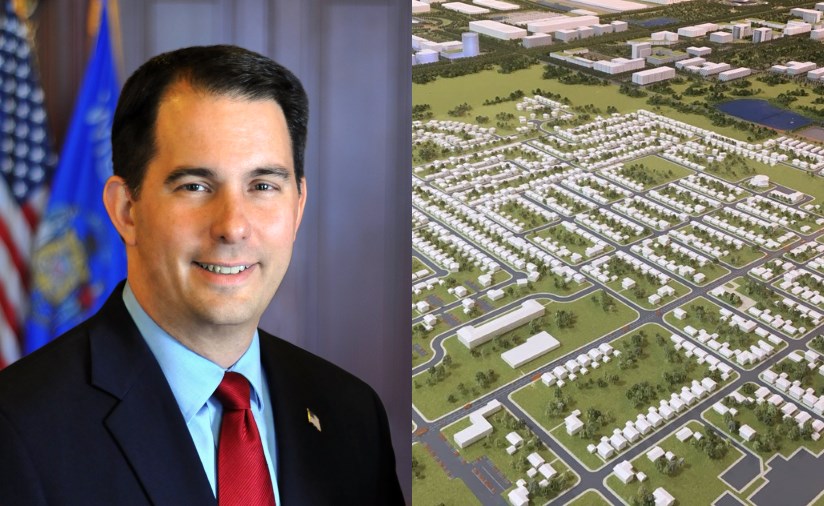12 Reasons The Foxconn Deal Is Dying
The company is cutting back plans. Will it walk away entirely?
From the outset, when the initial agreement with Foxconn was announced by Gov. Scott Walker, there were many reasons for Republican leaders to be wary of the company. It had a history of making extravagant pledges to governments and then walking away from the deal. And experts on technology warned that Foxconn was part of a fast-changing, brutally competitive industry where any plans by the company could quickly become outdated. Indeed, yesterday’s “news” that Foxconn wouldn’t be manufacturing televisions in Racine isn’t much different than what company officials said back in August. What’s new is a report by the Nikkei Asian Review saying Foxconn has decided to “suspend” its plans for Wisconsin and has recalled top staff from its planned project in Racine County. This adds more cause to doubt the company will come anywhere near to meeting the deal’s promised employment and investment goals. Here are 12 reasons the deal is in trouble:
1. Foxconn Can’t Manufacture TVs Competitively: The original proposal Foxconn made, to employ 13,000 workers, was based on manufacturing large screen televisions, but the company began moving away from that back in June 2018, and by August its frequent spokesperson Louis Woo declared “we are not really interested in television,” saying the much higher labor costs in the U.S. would guarantee failure, and the company was moving instead toward a plan where “90% of employees would be “knowledge workers.” This week’s announcement to Reuters merely made this crystal clear, with Woo explicitly ruling out the manufacture of advanced TV screens: “In terms of TV, we have no place in the U.S.,” he said. “We can’t compete.”
2. It Has No Real Plan B: Woo told Reuters his company was “not building a factory” in Racine County and will mostly hire engineers and researchers, but was still evaluating its options. But given that the company doesn’t know precisely what these engineers and researchers will be working on (Woo and Foxconn CEO Terry Gou have mentioned various possibilities since August), this will likely be a small-scale operation that must (a)hit on a product or services to sell in a fast-moving marketplace and (b) can be competitive paying American wages. For a company that has for decades been a Chinese-based contract manufacturer, the idea of transforming into an American knowledge-based operation seems like a pretty heavy lift.
3. The Company Prefers Robots: Even if those engineers and researchers ever came up with a product to manufacture, the odds are it will be made by robots. Gou has said the company plans to replace 80 percent of its workers with robots in the next five to 10 years. and Woo has previously said the Racine plant might use robots for 90 percent of any manufacturing. Which makes the company’s continued assurance it will hire the 13,000 workers look like pie in the sky.
5. It Has Slashed Employment Projections: “The company initially said it expected to employ about 5,200 people by the end of 2020,” Reuters reports, but “a company source said that figure now looks likely to be closer to 1,000 workers.” Timothy Bartik, an economist for the Upjohn Institute in Kalamazoo, Mich., has speculated to the New York Times that Foxconn intends to count spin-off jobs — it claims every employee it hires will generate 2.7 additional jobs in the state economy — to get to the 13,000, meaning the company hopes to eventually hire 4,815 employees.
6. The Promise to Invest $10 Billion Died: The state deal with Foxconn was premised on the 13,000 jobs and $10 billion investment Foxconn promised. But Foxconn’s letter to the WEDC, while continuing to insist on the 13,000 jobs, never mentioned the $10 billion goal. And in the Reuters story and other media accounts quoting Foxconn, only the promise of 13,000 jobs is mentioned, not the $10 billion. The Nikkei Asian Review story makes it official: Foxconn has suspended the $10 billion project.
7. Foxconn Lost Its Chief Champion: Walker seemed willing to give Foxconn whatever it wanted and those giveaways are all guaranteed by law, amounting to at least a $4.1 billion state and local subsidy. The Nikkei story says a disagreement with new Gov. Tony Evers over “side deals” the company made with Walker may have contributed to its decision to suspend the Racine project, but both Foxconn and Mark Hogan, CEO of the Wisconsin Economic Development Corp., said Evers “never sought to re-negotiate any element of the Foxconn project,” as the Milwaukee Journal Sentinel reported. Still, the defeat of Walker added more uncertainty to a project that has been falling apart since last June. As a result, “teams from Sharp and Foxconn display subsidiary Innolux sent to Wisconsin to support the program have been recalled to Japan and Taiwan,” as the Nikkei story reported.
8. Its PR Person Quit: High-profile PR operative Evan Zeppos of Michael Best & Friederich announced a month ago he was no longer representing Foxconn. Zeppos won’t discuss the reasons, but it may be another sign of Foxconn retrenching. Nor does it bode well that its new PR person is Keith Gilkes, a longtime campaign operative for Walker. If Foxconn cares at all about ingratiating itself with Evers, that’s not the way to do it.
9. It Could Face Environmental Obstacles: There’s a new head of the state Department of Natural Resources under Evers, and Preston Cole and his staff could raise many issues related to air and water pollution, should Foxconn ever manage to do any manufacturing at its Racine plant.
10. Foxconn Is Doing Major Cost Cutting: A company memo in November said it plans to cut expenses “by almost a half” in 2019, or some $2.9 billion in the face of ‘a very difficult and competitive year,’” as Bloomberg reported. But the new story by Nikkei adds more: “Foxconn will postpone most of the production planned in a 61 billion yuan ($9 billion) display panel project in the southern Chinese city of Guangzhou for at least six months… as the trade war between the two countries raises uncertainty over demand” and as “China’s economic growth has slowed to a 28-year low.”
11: It Won’t Get Subsidies for Non-Wisconsin Workers: In response to a Legislative Audit Bureau report noting the Foxconn deal allowed the company to collect tax credits for workers who don’t live in Wisconsin, the WEDC has tightened its procedures to prevent this. But Foxconn has struggled to find engineers and researchers from Wisconsin and has wanted to bring them in from elsewhere, notably China, as the Wall Street Journal reported. The WEDC rule change will mean less state subsidy or less choice on its employees for Foxconn.
12: There’s Nothing to Stop Foxconn from Pulling Out: The deal with the state rewards Foxconn for future investment and employment, but there is no cost for Foxconn should it walk away. Which it has done many times in the past. In 2013, the company announced it would invest $30 million in a high-tech factory in Pennsylvania that would create 500 jobs, only to abandon the deal. The company promised a deal that was expected to create 100,000 jobs in Brazil, but ending up employing 2,800.
As Alberto Moel, an investor and former technology analyst at the research firm Sanford C. Bernstein, told the New York Times, “Foxconn does the “big song and dance, bringing out the Chinese dragon dancers, ribbon cuttings, toasts and signature of the usual boilerplate agreements” and “Then, when it gets down to brass tacks, something way smaller materializes.”
All of which tells us the Racine plant won’t get anywhere near 13,000 employees and $10 billion. If Foxconn does stay here, it will be on a much smaller scale than the original deal proposed.
If you think stories like this are important, become a member of Urban Milwaukee and help support real independent journalism. Plus you get some cool added benefits, all detailed here.
More about the Foxconn Facility
- Foxconn Paid Mount Pleasant $15 Million Make-Up Fee in 2025 - Steph Conquest-Ware - Jan 6th, 2026
- Murphy’s Law: Total Cost of Foxconn Is Rising - Bruce Murphy - Dec 8th, 2025
- WEDC, Foxconn announce additional $569 million investment in Racine County - Wisconsin Economic Development Corporation - Nov 25th, 2025
- Foxconn Acquires 20 More Acres in Mount Pleasant, But For What? - Joe Schulz - Jan 7th, 2025
- Murphy’s Law: What Are Foxconn’s Employees Doing? - Bruce Murphy - Dec 17th, 2024
- With 1,114 Employees, Foxconn Earns $9 Million in Tax Credits - Joe Schulz - Dec 13th, 2024
- Mount Pleasant, Racine in Legal Battle Over Water After Foxconn Failure - Evan Casey - Sep 18th, 2024
- Biden Hails ‘Transformative’ Microsoft Project in Mount Pleasant - Sophie Bolich - May 8th, 2024
- Microsoft’s Wisconsin Data Center Now A $3.3 Billion Project - Jeramey Jannene - May 8th, 2024
- We Energies Will Spend $335 Million on Microsoft Development - Evan Casey - Mar 6th, 2024
Read more about Foxconn Facility here
Murphy's Law
-
Top Health Care Exec Paid $25.7 Million
 Dec 16th, 2025 by Bruce Murphy
Dec 16th, 2025 by Bruce Murphy
-
Milwaukee Mayor’s Power in Decline?
 Dec 10th, 2025 by Bruce Murphy
Dec 10th, 2025 by Bruce Murphy
-
Total Cost of Foxconn Is Rising
 Dec 8th, 2025 by Bruce Murphy
Dec 8th, 2025 by Bruce Murphy























This may be the best possible outcome for anyone concerned about the shady corporate handouts, environmental damage, and overall WI economy. Having the deal fail on its own will put the blame squarely on the republicans that authorized Walker’s Folly, regardless of how they try and spin it. Its unfortunate that the surrounding area will take such a financial hit on the underutilized infrastructure, but the total cost to WI will be less than if we continued down the path.
Plus, all the Chicago folks that vacation in WI. will have a nice, new, 5 lane highway to get them to their destinations.
It might be worth following up on the impact in Mt. Pleasant where they went into serious debt with a TID, to say nothing of the $120 million Walker diverted in highway funds for the extra lanes along 1-94. There are a lot of expenses that won’t be recovered, ever. I was always troubled by Mt. Pleasant’s secrecy and closed door utility meetings to limit criticism of their decisions. Karma is a bitch.
Scott Walker gets his pants pulled down. Couldn’t happen to a nicer guy, but the costs will be borne by taxpayers and the poor folks in Racine and Mt. Pleasant, of course, not Walker.
While No. 9 touched on the issue, I’d add pending law suit on the illegal water diversion from Lake Michigan. The Foxconn site is outside the Lake Michigan basin but because the City of Racine filed the request, the diversion rules were avoided according to Walker’s administration; but not so fast, this will be litigated in court.
I was nearly in tears (whether from laughter or sadness, or both) when Walker’s administration told citizens not to worry about the environmental rules when Foxconn was getting state waivers since the EPA under then Scott Pruit would ensure compliance with Clean Water rules! Then Cathy Stepp former DNR chief was appointed to head up the Regional EPA unit to ensure Walker’s environmental waivers would keep Foxconn’s dirty technology up and running. With Evers now heading the DNR appointment, Foxconn will get no such pass for polluting clean water and diverting Gt. Lakes water.
How much of a sucker would you have to be to believe that Foxconn is still planning to do a manufacturing facility of (smaller) panels? This is classic Trump/GOP BSing.
There’s no timetable as to when it’ll opemn, and they’ve backed off on the cost of the investment. All Foxconn needs to do is have 520 people at their various sites, and they get hundreds of millions of dollars for this year. Watch then take the money and run.
Who could have predicted this turn of events in the Foxconn deal? Oh wait, critics of the deal back in 2017 all talked about how Foxconn has a reputation of walking away from or significantly scaled such projects. Dan Wilson said it the best, karma’s a bitch.